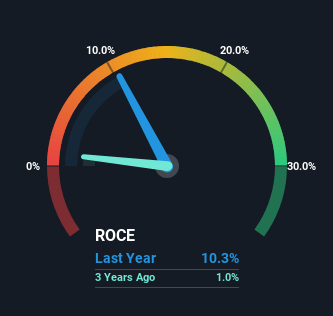New Zealand Oil & Gas (NZSE:NZO) Is Doing The Right Things To Multiply Its Share Price
What are the early trends we should look for to identify a stock that could multiply in value over the long term? Amongst other things, we'll want to see two things; firstly, a growing return on capital employed (ROCE) and secondly, an expansion in the company's amount of capital employed. This shows us that it's a compounding machine, able to continually reinvest its earnings back into the business and generate higher returns. With that in mind, we've noticed some promising trends at New Zealand Oil & Gas (NZSE:NZO) so let's look a bit deeper.
Return On Capital Employed (ROCE): What Is It?
For those who don't know, ROCE is a measure of a company's yearly pre-tax profit (its return), relative to the capital employed in the business. To calculate this metric for New Zealand Oil & Gas, this is the formula:
Return on Capital Employed = Earnings Before Interest and Tax (EBIT) ÷ (Total Assets - Current Liabilities)
0.10 = NZ$26m ÷ (NZ$271m - NZ$20m) (Based on the trailing twelve months to June 2023).
So, New Zealand Oil & Gas has an ROCE of 10%. In absolute terms, that's a pretty normal return, and it's somewhat close to the Oil and Gas industry average of 11%.
See our latest analysis for New Zealand Oil & Gas

Historical performance is a great place to start when researching a stock so above you can see the gauge for New Zealand Oil & Gas' ROCE against it's prior returns. If you want to delve into the historical earnings, revenue and cash flow of New Zealand Oil & Gas, check out these free graphs here.
What The Trend Of ROCE Can Tell Us
We're delighted to see that New Zealand Oil & Gas is reaping rewards from its investments and is now generating some pre-tax profits. About five years ago the company was generating losses but things have turned around because it's now earning 10% on its capital. In addition to that, New Zealand Oil & Gas is employing 47% more capital than previously which is expected of a company that's trying to break into profitability. This can tell us that the company has plenty of reinvestment opportunities that are able to generate higher returns.
What We Can Learn From New Zealand Oil & Gas' ROCE
In summary, it's great to see that New Zealand Oil & Gas has managed to break into profitability and is continuing to reinvest in its business. Given the stock has declined 23% in the last five years, this could be a good investment if the valuation and other metrics are also appealing. With that in mind, we believe the promising trends warrant this stock for further investigation.
On a final note, we've found 2 warning signs for New Zealand Oil & Gas that we think you should be aware of.
For those who like to invest in solid companies, check out this free list of companies with solid balance sheets and high returns on equity.
Have feedback on this article? Concerned about the content? Get in touch with us directly. Alternatively, email editorial-team (at) simplywallst.com.
This article by Simply Wall St is general in nature. We provide commentary based on historical data and analyst forecasts only using an unbiased methodology and our articles are not intended to be financial advice. It does not constitute a recommendation to buy or sell any stock, and does not take account of your objectives, or your financial situation. We aim to bring you long-term focused analysis driven by fundamental data. Note that our analysis may not factor in the latest price-sensitive company announcements or qualitative material. Simply Wall St has no position in any stocks mentioned.

 Yahoo Finance
Yahoo Finance 